- جدید



Germany, Federal Republic 1976 - Carl Maria von Weber 1v
توجه : درج کد پستی و شماره تلفن همراه و ثابت جهت ارسال مرسوله الزامیست .
توجه:حداقل ارزش بسته سفارش شده بدون هزینه پستی می بایست 100000 ریال باشد.
کارل ماریا فردریش ارنست فون وبر (به آلمانی: Carl Maria Friedrich Ernst von Weber) (۱۷۸۶-۱۸۲۶) آهنگساز آلمانی بود.
اپراهای او تأثیر زیادی بر شکلگیری اپراهای دوره رمانتیک آلمان داشت. وبر آثار زیادی برای ساز کلارینت نوشت. علاوه بر آهنگسازی، به نگارش مقالات موسیقی نیز میپرداخت.
وبر در اوتین، نزدیک لوبک بدنیا آمد. پدرش که خود در کار موسیقی بود مدتی آموزش او را بهعهده گرفت. وبر تحصیلات موسیقی خود را در زالتسبورگ و مونیخ ادامه داد. پس از مدتی که همراه خانواده به فرایبورگ در زاکسن رفت دوباره به زالتسبورگ بازگشت و شاگرد یوزف هایدن شد.
موفقیت او باعث شد تا چند شغل مربوط به موسیقی به او پیشنهاد شود. مدتی در دربار دوک ورتمبرگ کار کرد و چندی رئیس اپرای پراگ و بعد اپرای درسدن بود.
اپرای معروف او «در فرایشوتز» با موفقیت روبرو شد.
وبر از بیماری سل در سفری که به لندن رفته بود درگذشت.
Carl Maria Friedrich Ernst von Weber (18 or 19 November 1786 – 5 June 1826[1]) was a German composer, conductor, pianist, guitarist[2] and critic, one of the first significant composers of the Romantic school.
Weber's operas Der Freischütz, Euryanthe and Oberon greatly influenced the development of the Romantic opera in Germany. Der Freischütz came to be regarded as the first German "nationalist" opera, Euryanthe developed the Leitmotif technique to a hitherto-unprecedented degree, while Oberon may have influenced Mendelssohn's music for A Midsummer Night's Dream and, at the same time, revealed Weber's lifelong interest in the music of non-Western cultures. This interest was first manifested in Weber's incidental music for Schiller's translation of Gozzi's Turandot, for which he used a Chinese melody, making him the first Western composer to use an Asian tune that was not of the pseudo-Turkish kind popularized by Mozart and others.
A brilliant pianist himself, Weber composed four sonatas, two concertos and the Konzertstück (Concert Piece) in F minor, which influenced composers such as Chopin, Liszt and Mendelssohn. The Konzertstück provided a new model for the one-movement concerto in several contrasting sections (such as Liszt's, who often played the work), and was acknowledged by Stravinsky as the model for his Capriccio for Piano and Orchestra. Weber's shorter piano pieces, such as the Invitation to the Dance, were later orchestrated by Berlioz, while his Polacca Brillante was later set for piano and orchestra by Liszt.
Weber compositions for woodwind instruments occupy an important place in the musical repertoire. His compositions for the clarinet, which include two concertos, a concertino, a quintet, a duo concertante, and variations on a theme (posthumously), are regularly performed today. His Concertino for Horn and Orchestra requires the performer to simultaneously produce two notes by humming while playing—a technique known as "multiphonics". His bassoon concerto and the Andante e Rondo ungarese (a reworking of a piece originally for viola and orchestra) are also popular with bassoonists.
Weber's contribution to vocal and choral music is also significant. His body of Catholic religious music was highly popular in 19th-century Germany, and he composed one of the earliest song cycles, Die Temperamente beim Verluste der Geliebten ([Four] Temperaments on the Loss of a Lover). Weber was also notable as one of the first conductors to conduct without a piano or violin.
Weber's orchestration has also been highly praised and emulated by later generations of composers – Berlioz referred to him several times in his Treatise on Instrumentation while Debussy remarked that the sound of the Weber orchestra was obtained through the scrutiny of the soul of each instrument.
His operas influenced the work of later opera composers, especially in Germany, such as Marschner, Meyerbeer and Wagner, as well as several nationalist 19th-century composers such as Glinka. Homage has been paid to Weber by 20th-century composers such as Debussy, Stravinsky, Mahler (who completed Weber's unfinished comic opera Die drei Pintos and made revisions of Euryanthe and Oberon) and Hindemith (composer of the popular Symphonic Metamorphosis of Themes by Carl Maria von Weber).
Weber also wrote music journalism and was interested in folksong, and learned lithography to engrave his own works.
تشکر نظر شما نمی تواند ارسال شود
گزارش کردن نظر
گزارش ارسال شد
گزارش شما نمی تواند ارسال شود
بررسی خود را بنویسید
نظر ارسال شد
نظر شما نمی تواند ارسال شود

Germany, Federal Republic 1976 - Carl Maria von Weber 1v
check_circle
check_circle
















